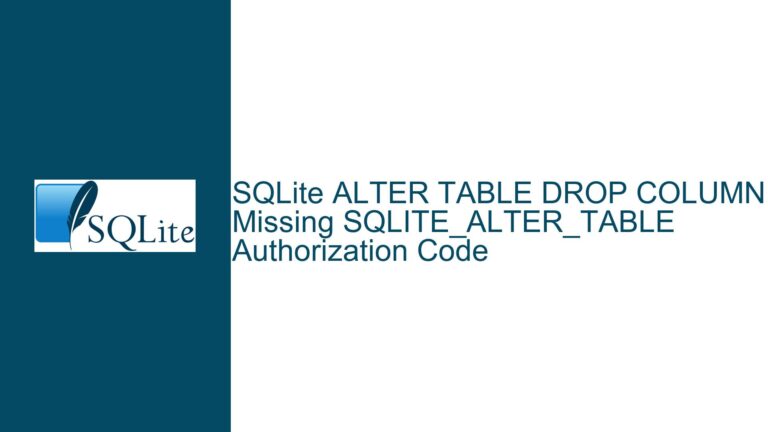Automating SQLite Trunk, Extensions, and UDF Integration on Linux
Core Initialization and UDF Integration Challenges
The process of integrating User-Defined Functions (UDFs) and extensions into SQLite involves several steps that can be error-prone, especially when automating the build process. The core issue revolves around the initialization of custom functions and extensions in SQLite, which requires a deep understanding of both the SQLite API and the build process. The core_init function plays a pivotal role in this integration, as it is responsible for registering UDFs and extensions automatically when SQLite starts.
The core_init function must be correctly implemented and integrated into the SQLite build process. This involves modifying the SQLite source code to include the core_init function and ensuring that it is called during the initialization phase of SQLite. The function itself must be carefully crafted to avoid errors, as any mistake can lead to SQLite failing to initialize properly, rendering the database unusable.
The integration of UDFs and extensions also requires careful handling of the SQLite build configuration. The build process must be configured to include the necessary flags and libraries to support the UDFs and extensions. This includes setting the appropriate compiler flags, linking against the correct libraries, and ensuring that the SQLite source code is modified correctly to include the core_init function.
Build Process and Dependency Management Issues
The build process for SQLite, especially when integrating custom UDFs and extensions, can be complex and fraught with potential issues. One of the primary challenges is managing dependencies and ensuring that all necessary libraries and tools are available on the system. The build script provided in the discussion attempts to automate this process, but it is not without its pitfalls.
The script begins by uninstalling any existing SQLite installation to avoid conflicts. It then proceeds to install the necessary dependencies, including fossil, tcl-dev, and libreadline-dev. These dependencies are crucial for building SQLite from source, but their installation can sometimes fail due to network issues, missing repositories, or conflicts with existing packages.
Once the dependencies are installed, the script clones the SQLite repository using fossil and updates it to the latest trunk. This step is critical for ensuring that the latest features and bug fixes are included in the build. However, the process of cloning and updating the repository can be slow, especially on a slow network connection, and it can fail if the repository is unavailable or if there are issues with the fossil command.
The script then configures and builds SQLite, including the creation of tools like sqlite3_analyzer and sqldiff. This step involves running the configure script and invoking make to compile the source code. The build process can fail for a variety of reasons, including missing dependencies, incorrect compiler flags, or issues with the source code itself.
Finally, the script integrates the core_init function into the SQLite build by appending the core_init.c file to the sqlite3.c source file and recompiling SQLite. This step is crucial for ensuring that the UDFs and extensions are automatically available when SQLite starts. However, the process of appending the core_init.c file and recompiling SQLite can introduce errors, especially if the core_init.c file is not correctly formatted or if there are issues with the compiler flags.
Troubleshooting Build Errors and Ensuring Proper Initialization
When integrating UDFs and extensions into SQLite, it is essential to troubleshoot any build errors and ensure that the core_init function is correctly initialized. The first step in troubleshooting is to carefully review the build script and ensure that all dependencies are correctly installed. This includes verifying that the necessary libraries and tools are available on the system and that there are no conflicts with existing packages.
If the build process fails, the next step is to examine the error messages and determine the root cause of the failure. Common issues include missing dependencies, incorrect compiler flags, and issues with the source code. In some cases, it may be necessary to modify the build script to address these issues, such as adding additional dependencies or adjusting the compiler flags.
Once the build process is successful, it is essential to verify that the core_init function is correctly initialized and that the UDFs and extensions are available when SQLite starts. This can be done by running SQLite and executing a query that uses one of the UDFs or extensions. If the query fails, it may indicate that the core_init function was not correctly integrated into the build or that there is an issue with the UDF or extension itself.
In some cases, it may be necessary to debug the core_init function to ensure that it is correctly registering the UDFs and extensions. This can involve adding logging statements to the core_init function to verify that it is being called and that the UDFs and extensions are being registered correctly. If the core_init function is not being called, it may be necessary to modify the SQLite source code to ensure that it is included in the initialization process.
Finally, it is essential to ensure that the build process is repeatable and that the resulting SQLite binary is stable. This includes verifying that the build script can be run on different systems without issues and that the resulting binary does not introduce any new bugs or issues. It may also be necessary to create a backup of the SQLite binary and the build script to ensure that the build process can be repeated if necessary.
Conclusion
Integrating UDFs and extensions into SQLite can be a complex process that requires a deep understanding of the SQLite API and the build process. The core_init function plays a crucial role in this integration, but it must be carefully implemented and integrated into the SQLite build process. The build process itself can be fraught with potential issues, including dependency management, build errors, and initialization problems. By carefully troubleshooting these issues and ensuring that the core_init function is correctly initialized, it is possible to create a stable and reliable SQLite build that includes custom UDFs and extensions.






